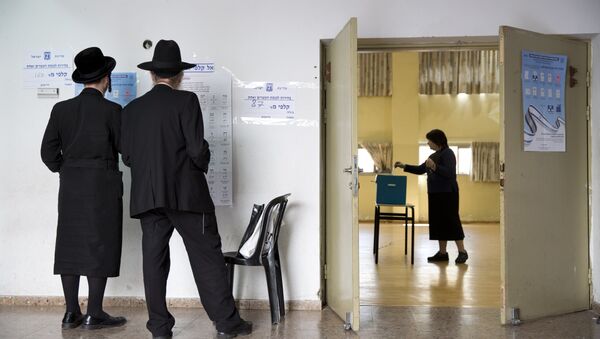In April 2019, during the first round of Israel's general polls, nobody saw it coming. Even though Benjamin Netanyahu's Likud party and its rival, Ex-chief of staff Benny Gantz' Blue and White came in equal, receiving 35 seats each in Israel's 120 seat parliament, the victory belonged to the right-wing bloc, which with 65 members had more than enough to form a stable government.
Once President Rivlin gave Netanyahu the mandate to start coalition talks, the situation looked promising. Negotiations with Gantz over a unity government were not an option, given the bad blood between the two leaders, and the prime minister opted for his "natural" partners - the right-wing bloc - thinking that victory was within arm's reach. He was wrong.
Beginning of an End
Things started to fall apart when one of Netanyahu's allies, Avigdor Lieberman, whose Yisrael Beitenu party had only received 5 seats, conditioned his joining the coalition upon the passing of the controversial draft law, that would require Israel's Orthodox men to serve in the country's military, from which most are exempt. For religious parties, however, that was a red line.
Netanyahu's efforts to bridge the gap between the two sides proved futile and realising that without Liberman his government was doomed, the Prime Minister opted to disperse the Knesset, calling for a second round of elections in less than one year, for the first time in Israel's history.
This time around things got even uglier. Netanyahu has always been known for using all means available at his disposal to attack political rivals. In the parliamentary race of 1996, he claimed that his then-opponent Shimon Peres would divide Jerusalem, something that eventually led to his defeat and the victory of Netanyahu. A decade later, in 2015, he released a video warning voters that "Arabs were streaming to the polling stations" to topple his right-wing government, a trick that got him re-elected.
Now, however, the assaults became personal. Th prime minister mocked Gantz' stuttering and confusion, as well as his inability to handle interviews or to stand in front of a crowd. Gantz, on the other hand, emphasised his military background, saying he was protecting the country "while Bibi was taking acting classes in New York".
Israel's public was tired of the dirt but polls showed a stalemate; Blue and White was leading, with 33 seats, while Likud had 32. Lieberman remained able to tilt the results in favour of either Gantz or Netanyahu, had he chosen to.
But he didn't. Instead, he was zigzagging from one bloc to another and when the time was up, with neither of the two contenders able to form a government, the Knesset was dispersed again, prompting a third vote.
Fighting for His Freedom?
Winning in March 2020 seemed like a mission impossible for Netanyahu. The Attorney General's announcement in November that saw the Israeli prime minister indicted in three graft probes brought the PM's popularity to an unprecedented low.
Several days after AG's decision was made public, a poll showed that 56 per cent of Israelis thought Netanyahu should have stepped down. The same survey revealed that Likud had sunk to 33 seats whereas its main rival received three seats more.
But Israel's media believes Netanyahu cannot afford to lose. If he does, that would not only mean the end of his political career and the probable disintegration of Israel's right-wing bloc, but it will also lead to his most probable incarceration.
If he wins, chances are high that he would pass the so-called French law that would allow him to avoid prosecution.
Winning, however, would not be easy. Firstly the left-wing used Netanyahu's corruption charges in their campaign to delegitimise the premier, who was presented not only as a man who had divided Israel but also as somebody who carried a heavy load of corruption.
On the political front, attempts to enlarge his right-wing bloc hit a dead end too. Lieberman stepped up his anti-Orthodox rhetoric, creating a chasm that couldn't be bridged, whereas religious parties that were divided failed to form a union.
It was then that Netanyahu decided to change his tactics. First, he gave up on his "divide-and-conquer" policy, emphasising his achievements in domestic and foreign policy.
Then it was a number of international stories that brought him much-needed media attention. These included the talks with Russian President Vladimir Putin, who agreed to pardon an Israeli woman jailed in Russia for drugs smuggling, the release of the peace plan introduced together with US President Donald Trump and a blitz visit to Africa to meet with the Sudanese President Abdel Fatah al Burhan.
Finally, it was the decision to bolster Likud's voters base by hitting the ground and talking to people. If during the second round of elections, Netanyahu has only attended conferences four times, preferring to exert his efforts into Facebook and Twitter, the third round has seen him attend dozens of events across the country in an attempt to bring in more votes.
These efforts bore fruit. According to Israel's Channel 12, Netanyahu's Likud is now leading with 35 seats, whereas the Blue and While list is falling two seats behind. The same poll revealed that the right-wing bloc is projected to get 58 seats. Although it is more than what the left-wing alliance can offer, it is still not enough to form a government.
And that means Israel could head to the polls in 2020 yet another time.




